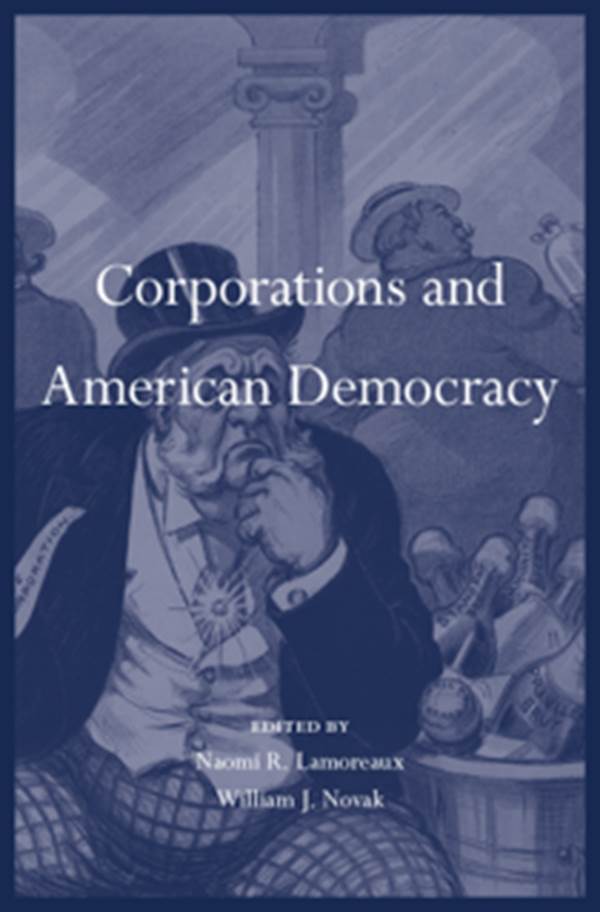
Summary
Edited by Naomi R. Lamoreaux (Yale University) and William J. Novak (University of Michigan).
Published by Harvard University Press.
Download introduction here.
The Supreme Court's decision in Citizens United v. Federal Election Commission has provoked passionate debate about the proper role of corporations in American democracy among academics, policymakers, and the public alike. From judicial opinions and dissents to the op-ed pages of newspapers, many have opined on the nature of corporate rights and responsibilities. To date, however, this discourse has remained primarily political, if not polemical. Many participants in this debate have made assertions about the history of the corporation in the United States that are at best outdated and all too often lack scholarly foundation.
This volume provides the historical grounding missing from these debates. Fourteen leading historians have come together to tell the complicated story of the corporation’s place in American democracy from the Founding Era to the recent past. With both detailed study of seminal moments of change and cross-cutting assessment of general trends, Corporations and American Democracy is essential reading for anyone who wants to understand how the American polity has wrestled with the possibilities and dangers of the corporate form throughout our nation’s history. Through their detailed exploration of the historical record, the authors reveal America’s long, surprising, and largely uninterrupted history of attempting to channel corporate power to protect and enhance democracy.
|
Contents
Corporations and American Democracy: An Introduction
Naomi R. Lamoreaux, Stanley B. Resor Professor of Economics and History, Yale University
William J. Novak, Charles F. and Edith J. Clyne Professor of Law, University of Michigan Law
PART I: CORPORATE ORIGINS
- Early American Corporations and the State
Eric Hilt, Associate Professor of Economics, Wellesley College
- Corporations and Organizations in the United States after 1840
Jessica Hennessey, Associate Professor of Economics, Furman University
John Wallis, Professor of Economics, University of Maryland, College Park
PART II: THE TURN TO REGULATION
- The Dissociation of Incorporation and Regulation in the Progressive Era and the New Deal
Daniel Crane, Frederick Paul Furth Sr. Professor of Law, University of Michigan Law
- The Public Utility Idea and the Origins of Modern Business Regulation
William J. Novak, Charles F. and Edith J. Clyne Professor of Law, University of Michigan Law
- Corporate Taxation and the Regulation of Modern American Business
Steve Bank, Paul Hastings Professor of Business Law, UCLA Law School
Ajay Mehrotra, Professor of Law and Louis F. Niezer Faculty Fellow; Adjunct Professor of History, Maurer School of Law
PART III: THE CHANGING CORPORATE FORM
- From Fiscal Triangle to Passing Through: Rise of the Nonprofit Corporation
Jonathan Levy, Professor of United States History, University of Chicago
- The Transformation of American Corporations and the Case for Line Drawing in Corporate Rights Jurisprudence
Margaret Blair, Milton R. Underwood Chair in Free Enterprise, Vanderbilt Law School
Elizabeth Pollman, Professor of Law, Loyola Law School
- Corporations and the Fourteenth Amendment
Ruth Bloch, Professor Emeritus, University of California, Los Angeles
Naomi R. Lamoreaux, Stanley B. Resor Professor of Economics & History, Yale University
PART IV: MODERN CORPORATE CHALLENGES
- Two Cheers for Vertical Integration: Corporate Governance in a World of Global Supply Chains
Nelson Lichtenstein, Distinguished Professor of History, University of California, Santa Barbara
- Citizens United, Personhood, and the Corporation in Politics
Adam Winkler, Professor of Law, UCLA Law School
|